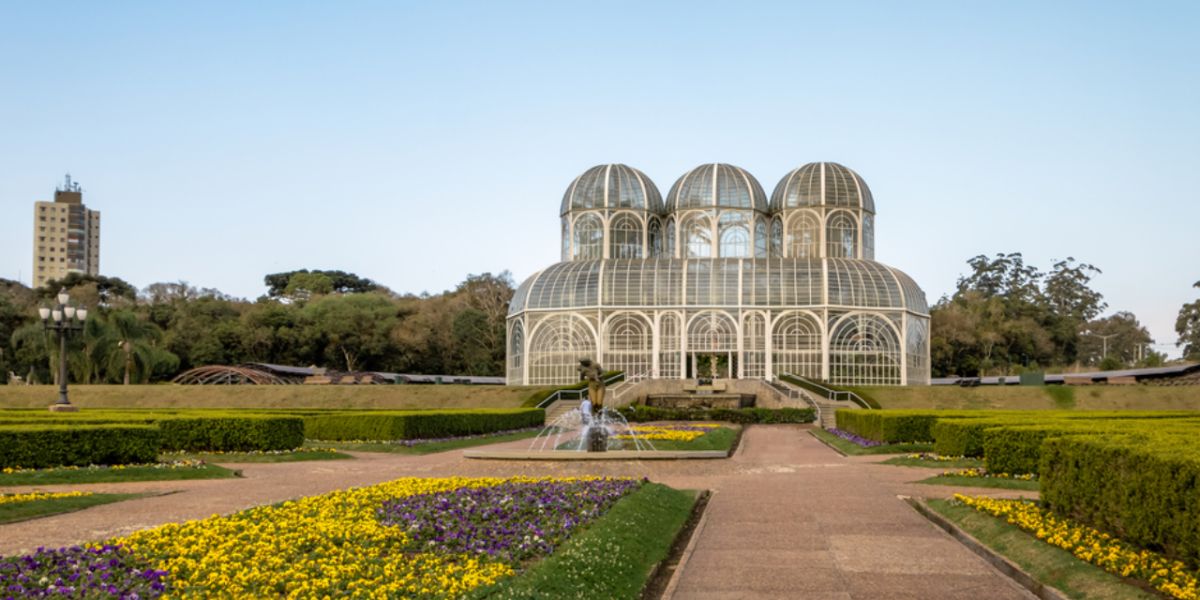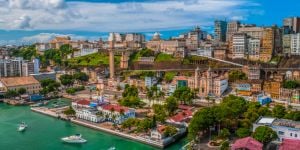
Curitiba attracts many foreigners, who come both for work and because Curitiba offers a high standard of living. Many foreign companies have offices and facilities in Curitiba. But if you'd like to work there, you're advised to begin your search for a job from abroad. You can start by reviewing Expat.com's general guidelines for working in Brazil.
About Curitiba
Curitiba is located in the state of Paraná, and is in fact, its capital. It's also the largest city in all of Paraná. The metropolitan area has 26 municipalities. The city of Curitiba is on a plateau and is the center of many Latin American subjects, such as politics and economics.
What's interesting to note about Curitiba is has a high Human Development Index, which is something not many Brazilian cities have. This makes it a fantastic city to live in in Brazil. It also has a low crime rate, so it's relatively safe compared to other Brazilian cities. Not only is Curitiba one of the best cities to live in, but it's also one of the best to invest in.
Curitiba was the host city for the FIFA World Cup in both 1950 and 2014.
The economy of Curitiba
Brazil has recently emerged from a recession. While Curitiba wasn't spared the effects, it's suffered less than many other cities. The economy isn't booming as it was a few years back, but it's large and diversified, and so there are always some opportunities available for those who qualify. In fact, its 30-year economic growth rate was 7.1% higher than the national average of 4.2%. Also, between 1975 and 1995, this city's domestic product jumped up 75% more than the entire state of Paraná. Even more impressive is, its domestic product grew by 48% more than the entire nation.
In the early days, Curitiba was an agricultural market, and agriculture (especially soybeans) still plays a major role in the local economy. But today, its economy is based more on industry, commerce, and services. Curitiba receives a great deal of foreign investment.
In Cidade Industrial de Curitiba, the industrial district, you'll find multinational firms such as Nissan, Renault, Volkswagen, Philip Morris, Audi, Volvo, HSBC, Siemens, ExxonMobil, Electrolux, and Kraft Foods, as well as many well-known national industries, such as Sadia, O Boticário, and Positivo Informática.
Sectors with potential
The automobile industry is a core component of the local economy. Curitiba is Brazil's second-largest car manufacturer with Nissan, Renault, Volkswagen, Audi, and Volvo all producing cars and trucks here.
Information technology is also a growing component. The IT industry employs over 40,000 workers in companies such as Motorola, Siemens, Brasil Telecom, and Impstat. This sector represents an opportunity for those with the requisite education and skills.
Tourism is also a large component these days, and is growing at over 5% per year. Over two million tourists visit Curitiba each year.
There's one international school in Curitiba named, prosaically enough, The International School of Curitiba. Certified teachers or education administrators might want to apply for work there.
How to write a Brazilian resume
In most cases, you should write your Brazilian resume in Portuguese, as this is the official language of the nation. However, you might be able to use English if you're applying to a multinational company, which is very likely in Curitiba. But do note that writing in Portuguese will be more impressive, so try to do so if you can.
Keep your resume to a maximum of two pages. At the top of your resume should be your most recent job experience, then list all the rest in reverse chronological order. You should also do the same for your educational experience, minus elementary school.
Don't just submit your Brazilian resume to job applications. Make sure you also type up a cover letter, which should be no longer than one page. It should be unique for every application and this document should cover why you want the position, your strengths, and how you'd benefit the company.
Finding work in Curitiba
Considering that there are many multinational companies in Curitiba, plus the fact that its economy is huge in Brazil, this is one of the best places to find work, whether you're a native Brazilian or expat. Here are some ways you can get your foot in the door.
Most job seekers today start with LinkedIn, as it's online and connects you to a whole world of opportunities. It functions like Facebook where you can add people you know, but it also has a separate page for job listings. Take advantage of this platform and add as many people you know, especially Brazilians.
You should also brush up your resume and upload it onto LinkedIn. That way, when you search and apply for jobs, you can simply attach it instead of filling in the blanks each time. You can look for particular positions or just leave that part of the search bar blank and then type in Curitiba for the location.
If a company wants to proceed with you, they'll either reply through the LinkedIn inbox or email, so keep an eye out. If you're lucky, you might even get recruited through LinkedIn. However, you should be wary of scams, especially those that ask you to pay or for personal information.
Embassy and Inter-Governmental websites
Your home country's embassy should have a list of multinational firms, as should inter-governmental websites. This will make it easier to find something you're qualified for, as you won't have to search up these multinationals' sites yourself.
Applying to multinational companies can be highly advantageous when compared to other work routes (more on this later).
Personal references
LinkedIn may be a digital network, but you probably have an in-person network built up already. If so, then getting personal references this way can be invaluable.
Get in touch with friends who are either Brazilian, are living in Brazil, or know someone who's Brazilian/living in the country. Let them know what you're looking for and to ask around for you. With any luck, you'll get in touch with the right people and find the perfect way to become employed in Curitiba and move there.
Brazilian newspapers
It might be unbelievable, but employers still list open positions in newspapers. So if you're able to, purchase some Brazilian newspapers and see if there are any interesting job listings. You can also have any Brazilian friends do so for you.
Otherwise, try Googling the papers online. You should be able to find the digital version. If you aren't able to read Portuguese, don't bother translating it, as these employers will want someone who can speak the language.
Employment agencies
For your best chances at employment, try an employment agency. You'll have to pay them a fee, but it's well worth it when they can get you an interview in a flash. This is because they're right there in Curitiba and know the area like the backs of their hands.
They'll also take care of coordinating interviews with employers so you won't have to stress out about looking for jobs and contacting potential companies. This can help you focus on your possible upcoming move to Brazil.
Tips for finding work in Brazil
Brazilian companies are required to try and find native Brazilians for their positions before looking elsewhere. Because they need to prove they've done so, this makes them more reluctant to hire foreigners, as they won't want to bother with the trouble. To make things even worse, they must maintain a workforce of at least two-thirds Brazilians, so there are even fewer opportunities for you.
The good news is if you've lived in Brazil for 10 years, are married to a Brazilian citizen, and/or have a Brazilian-born child, you're exempt from the above requirements. Otherwise, it'll be challenging to find employment. This is especially true when you consider that your foreign titles and certificates aren't recognized in Brazil. You must retake exams in Portuguese, which may be near impossible for some people.
A good alternative is to work for multinational firms in your home country first. Once you've been there for a little bit, you can ask your company to transfer you to the Curitiba branch. This negates everything we've told you above, which means your titles and certificates will still be valid.
Brazilian work culture
Those familiar with Western work culture will find it a breeze when adapting to Brazilian work culture. They follow the same structure, including strict hierarchies, with well-defined roles. Expect the workplace to be formal and corporate as well.
In corporate settings, you'll find that most employees have a good foundation for English, especially those on the younger side. This is because corporate workers tend to have higher education and in recent years, Brazilian schools have introduced more English classes to children. So if you're struggling with Portuguese and/or you just want a break from it, it'll probably be possible to speak English at least occasionally at work.
As for the dress code, there are no surprises here. Corporate settings require you to dress professionally. Brazilians highly value appearances, so make sure you're immaculate when you turn up to work.
What most expats find shocking is how tardiness is readily accepted. In fact, you'll likely see at least a few colleagues show up to meetings 10 to 20 minutes late. No one will bat an eye, as this is the norm in Brazilian workplaces. But just because your coworkers show up late doesn't mean you should as well. In the end, everyone will appreciate it if you attend meetings on time.
Also, while workplaces are formal and corporate, it's also rather “informal” as well. Interpersonal relationships are important, and you'll see your coworkers make a genuine effort to get to know you. You should definitely do the same if you want to fit into your office. You should also embrace their casual way of greeting one another; that is, with a hug. If you and/or the person you're greeting is a woman, follow up with two kisses on each cheek.
For your information, as you go from the south of Brazil to the north, workplaces and social settings will get more and more casual. Because Curitiba is in the south of Brazil, you should expect interactions to be mostly formal.
Living in Curitiba
With over 3.77 million inhabitants, Curitiba is the largest city in Brazil's south region. Despite its size and rapid growth in recent decades, Curitiba has managed to preserve many green areas. In fact, Curitiba is sometimes referred to as the Ecological Capital of Brazil. The city's leadership has been very forward-thinking. In the 1960s, careful urban planning led to accelerated growth, but in a controlled fashion. Curitiba's mass transit system has served as a model for many other cities. Curitiba introduced one of Brazil's recycling programs, and you'll see that the locals take a lot of pride in how progressive their city is.
Curitibanos also take a lot of pride in their roots and ethnic diversity. Immigrants from many European countries (including Germany, Italy, Poland, and Ukraine) and also Japan and the Middle East, built the Curitiba of today.
A glance at the list of the city's parks reflects this diverse heritage: German Woods, Italian Woods, Japan Square, and Portugal Park are among many other parks. Sprawling Tanguá Park is very popular for joggers and cyclists, especially on weekends.
Curitiba also boasts many cultural activities. There are several museums, including a museum honoring Oscar Neimeyer, the architect who designed Brasília, and also lovely botanical gardens. Although located on a high ridge, Curitiba isn't far from the beach. A popular day trip is to take a scenic train from Curitiba down through the Atlantic forest to the beach.
The best areas to live would be near the botanical gardens, which are well served by all forms of transport. The city center is also popular and is near shopping and services. Best of all, while Curitiba is a prosperous city, it isn't expensive, and rent prices are very reasonable.
Useful links:
We do our best to provide accurate and up to date information. However, if you have noticed any inaccuracies in this article, please let us know in the comments section below.








